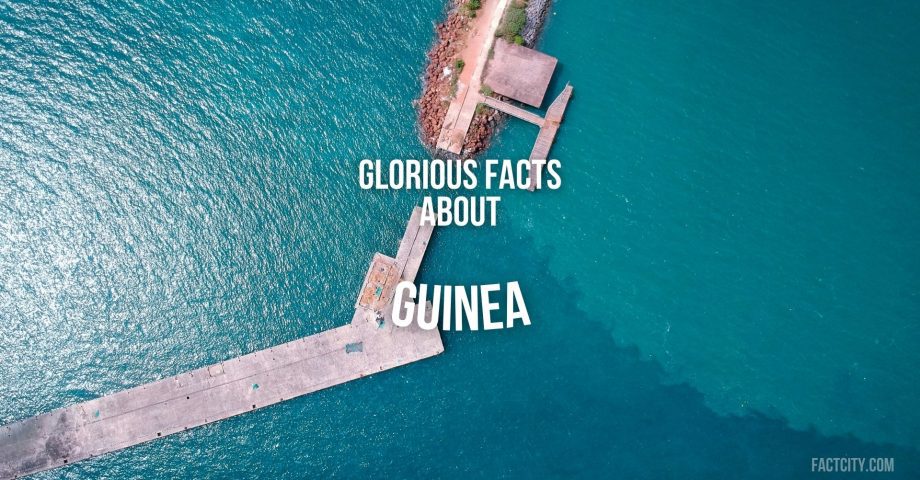Guinea is a coastal African country with stunning sights and a fascinating, if turbulent history – and, you’d be forgiven for getting it confused with a few other similarly named countries! There’s Papua New Guinea, Equatorial Guinea, British Guinea, Guinea-Bissau, New Guinea… they seem to be everywhere!
In this fact file, however, we’ll get straight down to business and focus on the original Guinea, an independent nation with an economy based deep (literally) in mining. Let’s take a closer look at this tropical territory and see what sets it apart from the other Guineas – here are some fun facts about Guinea you’ll want to remember.
1. Its full name is the Republic of Guinea.
When you mention Guinea by name, it’s likely people will assume you’re talking about the Republic of Guinea, its full title. However, it’s easy for some to confuse the Republic with Guinea-Bissau, another West African country – the Republic can be found to its southeast.
Some people even refer to Guinea as Guinea-Conakry, which includes the name of the capital city, just to distinguish it from Guinea-Bissau.
There’s Equatorial Guinea, too, which is formally known as the Republic of Equatorial Guinea – just to make matters even more confusing! This nation is found towards the west of Central Africa.
The reason for its full name as a Republic is thanks to its independence, which it eventually gained from France several decades ago. More on that a little further down!
2. Guinea is on the western coast of Africa, and has a few neighbours.
Guinea is on the western coast of Africa. It shares its borders with Guinea-Bissau (as mentioned), Mali, Côte d’Ivoire, Liberia, Senegal, and Sierra Leone. It’s a pretty central starting point if you’d like to explore multiple African territories at once.
It’s larger than Guinea-Bissau, Senegal, Sierra Leone, and Liberia. In total square miles, the land area of Guinea is around 94,926, which is around 245,857 square km. That puts it at around the same size as the UK, which is just over 94,000 square miles or 243,000 square km, too!
3. Conakry is the capital of Guinea.
Conakry is the capital and also the largest city of Guinea! It serves as the economic, political, and cultural centre of the country. There’s said to be more than two million people living in the city as-is, which means roughly a seventh of the country’s population resides there.
Compare this to how many people live in London – just fewer than ten million at the last count, meaning it’s home to just under a seventh of our population, too! Strange how many things we have in common with Guinea so far!
4. Guinea was once a French colony.
Guinea officially gained independence from France on October 2nd, 1958! In so doing, it became the first French-speaking country in Sub-Saharan Africa to gain independence. It was once known as French Guinea (for reasons that should be pretty obvious) – making up what was known as the French West African territory.
However, independence didn’t mean that Guinea was, sadly, free from coups and power grabs. In 1991, for example, Guinea was seized by a military junta, which wouldn’t be released until a civilian administration took over in 2010. Now, Guinea elects a President and a legislature once every five years.
The UK didn’t colonise Guinea and had no part in that stage of its history – however, there was a country called British Guinea during colonial rule, but this went on to be renamed Guyana, in South America.
5. Guinea citizens speak a variety of languages.
Despite having gained independence from France, the official language of Guinea remains French. However, there are over 24 ethnic languages spoken throughout the country, including Malinke and Soussou. However, as long as you know at least a little French, you should get by perfectly fine!
English isn’t an official language here, but there’s a good chance that there is a small portion of the populace that speaks it. That said, you’re always better off trying to learn the local tongue(s) if you’re visiting! It’s thought that around 28% of Guinea’s population, at last count, speaks French.
6. Guinea is a highly musical nation.
Guinea is known for having a rich cultural heritage, with entertainment playing a huge part in the national identity. Music and dance specifically play a significant role in Guinean culture, with the country known for its vibrant drumming displays and colourful festivals – which many recommend as among some of the boldest and brightest on the planet.
Several musicians from Guinea have made a splash overseas – such as the late Mory Kanté, who was best known for his song ‘Yéké Yéké’. Other Guinea artists you might want to check out on Spotify include Bil de Sam, Mamady Keïta, and Balla Et Ses Balladins.
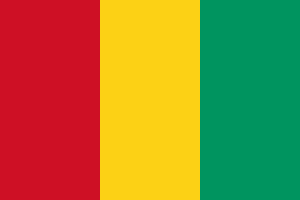
7. Guinea’s economy revolves around its incredible natural resources.
Guinea’s economy is based primarily on agriculture and mining. It is one of the world’s leading producers of bauxite, used in the production of aluminium.
The country also commonly trades in oil, gold and uranium, and it also has a major fishing industry. Despite its booming industry in agriculture and natural reserves, however, much of the country suffers in poverty – up to three quarters, in fact. Much of this is blamed on financial inequality and insecurity across the nation.
In addition to poverty, Guinea reportedly has one of the lowest adult literacy rates on the planet – with around four in ten people being fully literate across the country, a clear minority.
8. The weather is usually sweltering in Guinea.
Guinea has a tropical climate, with a wet and dry season. The country experiences high temperatures and humidity throughout the year. So, any time during the year is the perfect time to visit – provided you’re happy to contend with average temperatures hitting the low to mid 30s! Plenty of British people would probably call the climate here ‘muggy’!
And, understandably so. Compare the average temperatures to the UK, where we normally receive between 18 to 25 °C – and, rainfall averaging up to 1,400mm. In Guinea, the average rainfall is between 2,100 and 5,000mm during its rainy season – they have us beat in that regard!
9. Guinea has been recognised by UNESCO.
Guinea is known for its stunning landscapes! These include the Fouta Djallon highlands, the Mount Nimba Strict Nature Reserve, which happens to be a UNESCO World Heritage site, and the scenic coastline along the Atlantic Ocean.
Mount Nimba covers more than Guinea alone, however. It sits at the borders of Côte d’Ivoire and Liberia, too – and was added to UNESCO’s protected list back in the early 1990s.
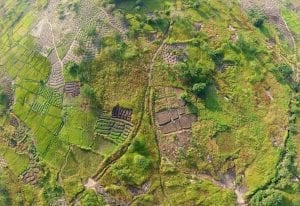
10. Guinea uses a variation on the Franc.
Thanks to its connections with France, Guinea uses the Guinean Franc, meaning it’s worth changing your money up before you travel here!
In fact, when changing GBP into Francs, you’ll find that the Pound is actually much stronger than Guinea’s currency – and it’s been this way for some time. At the time of writing, one British Pound is worth around 11,500 Guinean Francs!
This hasn’t been the record exchange rate between the two currencies, however. In early 2021, you could get more than 14,000 Guinean Francs for one British Pound.
Keep in mind, of course, that foreign exchange rates always fluctuate, and the figures I’m sharing today likely won’t be the same for the months and years to come. Always make sure to check exchange rates before you travel via your bank or with a trusted currency specialist.
11. Guinea’s tourism is apparently growing.
There are no exact figures to suggest how many people travel from the UK to Guinea every year, but its yearly tourist figures are apparently growing, based on recent research. As many as 130,000 people visited the region around 2013, for example – which isn’t exactly recent data, but it’s interesting to see that visitor figures have increased significantly since the early 2000s.
On the flip side, it’s also not particularly clear how many Guinea nationals now live in the UK, so I’m unfortunately not able to give you a firm figure of who’s heading to and from Africa each year. That said, the foreign-born population of the UK is thought to be more than nine million people at last count, meaning there may be people born in Guinea in that number.
12. The UK offers travel advice to anyone visiting Guinea from Britain.
The Foreign Office’s official advice to travellers to Guinea at the time of writing suggests that travel is not guaranteed safe – and that you cannot rule out terrorism in the country. Despite the height of the 2020s coup having ended in 2021, the UK government is quick to advise that such situations are sensitive to change. It’s also worth noting that Guinea has a strong military presence, particularly during election periods.

13. There are some entry requirements for Guinea that you’ll need to keep in mind.
If you’d like to travel to Guinea from the UK, there are a few documents that you should have ready to hand at the border, so you can be permitted entry.
For example, you must have a full, valid British passport, which expires at least six months after your arrival date.
In terms of visas, Guinea will allow stays for up to 90 days, and you’ll need to take care choosing the right one! The Foreign Office has advice on how to apply for visas in Guinea online, and how to make sure you’re covered for the duration of your stay.
As with many other African nations, you must also be able to prove that you are vaccinated against yellow fever, but only if you’re travelling from somewhere considered a transmission risk. The UK isn’t one of these – the disease largely impacts other African nations and some across South America.
Regardless, you should always check the latest vaccination guidelines for Guinea before you travel here, just in case there have been changes made to protocol.
14. You’ll need to be wary of some health risks in Guinea.
Guinea is sadly at risk from some particularly vicious diseases – for example, the Zika virus, the aforementioned yellow fever, dengue, malaria, and ebola. Ebola last broke out in Guinea in 2021 (at the time of writing).
The Foreign Office advises that healthcare in Guinea is rudimentary and some administrations aren’t sterile – meaning that, should you need emergency medical treatment, you will usually need to evacuate back to Europe.
With that in mind, you should always make sure you have adequate medical insurance covering your travel away from home in case you need it.
15. There are several ways to get from the UK to Guinea.
You can fly from several airports across the UK into Conakry, Guinea, such as via Edinburgh, Manchester, Newcastle, and Birmingham. However, given the length of the journeys involved, there will sometimes be layovers.
The best way to get to Guinea, however, is by flying out of London. For example, you can board Ryanair flights out of London Stansted to arrive in Conakry.
Flights from the UK to Guinea can take eight to 12 hours or even more, so be prepared with lots of entertainment and to catch some sleep on the journey if you can! It’s also a good idea to check online services such as Rome2Rio and SkyScanner for the latest connections between the UK and Guinea – as the details I’m sharing here might not always be valid!
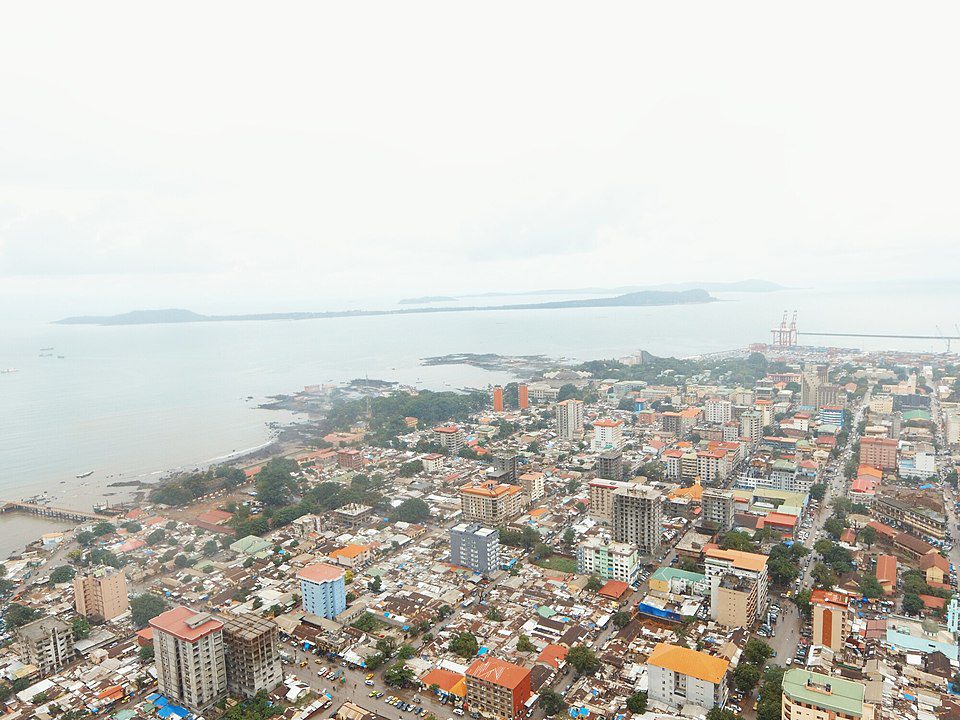
16. There’s a British Embassy in Guinea that supports people travelling from the UK to Conakry.
The British Embassy in Guinea is based at Villa 1, Residence 2000 Corniche, in South Conakry. The Embassy is responsible for maintaining relations between Guinea and the UK, and also offers advice to people from the UK who have travelled or set up home in West Africa.
You can contact the Embassy for any concerns you may have by appointment – but, the official UK Government website suggests that you can apply for emergency assistance, such as replacement travel documents, or with crime or injury, online. Check out their full advice here before you contact the Foreign Office.
17. The vast majority of Guinea citizens are practicing Muslims.
One thing you must be aware of and be respectful of if you travel to Guinea is the fact most people here practice Islam. In fact, it’s thought that up to nine out of ten people in Guinea identify as Muslims. What’s more, the fourth-largest mosque on the continent is in Guinea!
Compare this to the number of people in the UK who practice Islam – only around 6% of British citizens identify as Muslim at present. That means you can expect a quite different culture when you travel.
18. Guinea is a registered member of several international organisations.
Guinea is a registered and invested member of a number of organisations, such as the International Monetary Fund, or IMF, the United Nations, or UN, and the World Bank. Given its large Muslim population, the country is also a member of the Islamic Development Bank, or IDB.
Guinea also claims membership in several bodies that represent African nations, such as the African Development Bank, or ADB, the African Union, and the Economic Community of West African States. It’s also a member of the Agency for the French-Speaking Community, despite no longer being a French colony.
Some incidents in Guinea’s recent history have gained concern from fellow members of international bodies. For example, the UN opposed the 2021 coup, and the African Union also considered applying sanctions to the country.
It’s also a member of ECOWAS, but had its membership suspended during the coup on condition that President Alpha Condé be released.
19. It’s got an amazing coastline.
What some people may not know about Guinea is the fact it has an absolutely stunning array of beaches, making up more than 200 miles or around 320 km. Bel Air and Sobane beaches, for example, are some of the hottest, sandiest spots to sit on and watch the sea. Why travel somewhere with a coastline if you’re not going to head to the beach?
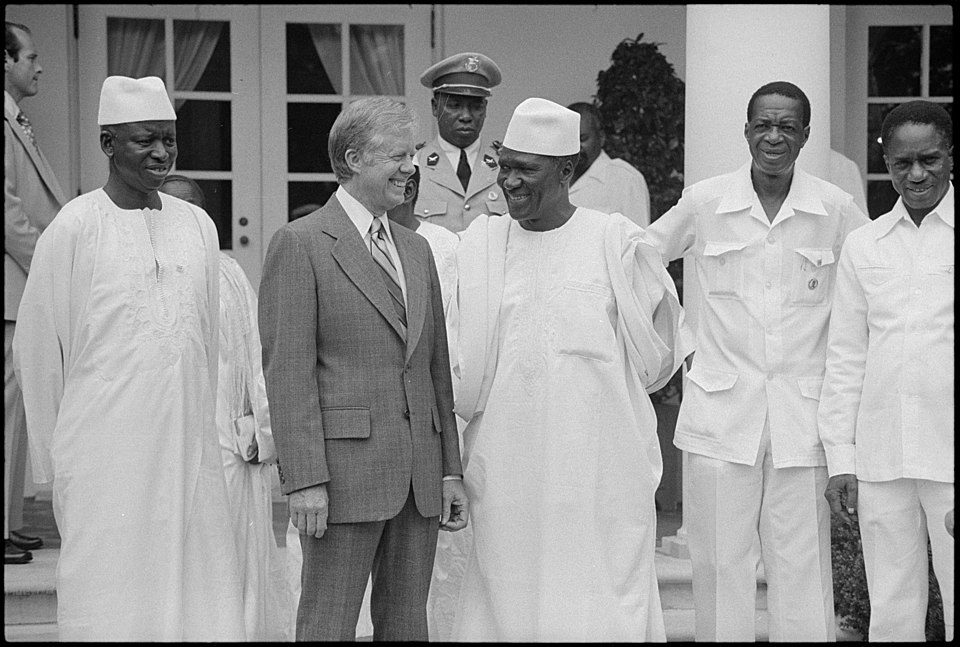
FAQs About Guinea
Is Guinea the smallest country in Africa?
No, despite its small size, Guinea is not the smallest country in Africa! The Seychelles is the smallest African nation overall. However, Gambia holds the accolade as the smallest continental country in Africa.
Why are there four countries called Guinea?
Since European colonizers divided certain African countries, many claimed their own Guinea. So, there was French Guinea (now known as Guinea), Spanish Guinea (which is now known as Equatorial Guinea), and Portuguese Guinea (which became Guinea-Bissau). Confused? We don't blame you!
What are people from Guinea called?
People from Guinea are known as Guineans! As of 2021, 13.53 million people were living in Guinea!
Further reading:
https://facts.uk/tag/Caribbean
https://eros.usgs.gov/westafrica/country/republic-guinea
https://www.bbc.co.uk/news/world-africa-13442051
Do you know any fun facts about Guinea? Share them in the comments below!
